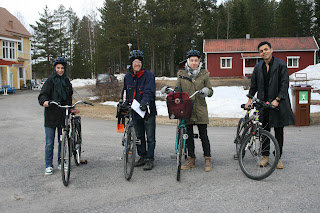By Josh Armfield
Another important value of the Go(o)dSeed project is Solidarity. Wikipedia defines solidarity as "an awareness of shared interests, objectives, standards, and sympathies creating a psychological sense of unity of groups or classes. It is based on class collaboration. It refers to the ties in a society that bind people together as one." For me solidarity is the practice of compassion and remembering our connected-ness. We all need each other. Another example of Solidarity is described in the Bible as the people of God being like a body. "The body is a unit, though it is made up of many parts; and though all its parts are many, they form one body. So it is with Christ. For we were all baptized by one Spirit into one body--whether Jews or Greeks, slave or free--and we were all given the one Spirit to drink." (1 Corinthians 12:13). The text goes on to explain that each part of the body needs the other. Each part of the body has something important and unique to offer, and without it the body suffers and is incomplete.
In our individualistic society we tend to think that it is a shame to ask for help. One should be independent and self-sufficient. One shouldn´t need to ask for help. And the ones who need to ask for help are somehow weak or unsuccessful. It is these "needy" ones that we usually think of when we think of charity. Even Solidarity I think can often be connected to thinking of the "less fortunate". But I believe this is a misunderstanding of what Solidarity and compassion means. Solidarity is the recognition that we are dependent on each other and that our own well-being is connected to the well-being of those around us, neighbors and even strangers.
 |
| The bike trailer full of bread donation |
The other day as Alicia and I were getting the bread donation for our Tuesday community meals from Coop my bicycle lock got stuck and I was unable to unlock my bike. I needed to buy some lock oil in order to loosen the lock. I was frustrated and a little stressed at the event. We would need to walk with the bread back to the church and then I would have to come back to fix the bike lock. But just after we had walked only 20 meters a friend that we know from the community meal bumped into us. This friend (or acquaintance) is not one that I would have imagined getting much help from. He is often under the influence and can create disruptions in our community gatherings. But on this particular day he was really understanding and concerned about us. He stopped us and asked, "Josh, where is your bike and why are you carrying the bread?" I told him the situation and he immediately reacted by reaching into his backpack and pulling out the exact lock oil that I needed to unlock my bike. "Here, just spray this on it and jiggle the lock a bit. It´ll open." I was shocked with surprise and joy! I shouted in jubilation and said, "what! Why do you have this, of all things, in your bag!?" He answered. "Ha, ask why I don´t have in my bag."
 |
| Alicia and Anna serving cassarole |
This encounter really changed my day. The man who helped me is usually the one I experience as "needing help". But on this day I was reminded of my own neediness and the compassion which was shown to me was unexpected and beautiful. I needed him. Later that evening about 25 of us gathered in the dining room at EFS church. We began, as we always do, by standing in a ring, me standing next to my "helper" that day. Everyone was welcomed to introduce themselves by name and we reminded each other that we are gathered in order to share our connect-ness. We sang a song of blessing over the food and then shared a home-cooked meal together with potato casserole prepared with home-grown vegetables from Sundet.
It is the relationships grown through the setting of the Tuesday community meal that make encounters and acts of solidarity like what we experienced on the street that day possible. If not for the Tuesday community meals that we have shared numerous times together my unexpected helper would not have recognized me on the street. He would not have seen my needs and would not have cared or been able to reach out to help.
 |
| Everyone helps prepare the meal! |
This is why our community meals are so important. It is in hospitality and community that we create understanding and room for compassion. Prejudice, fear, and cultural differences are broken down when we share table-fellowship together. It is in these sort of places of community that we can see our connected-ness, that we need one another, that we are all God´s dearly loved children in need of acceptance, love and friendship.






Comments
Post a Comment